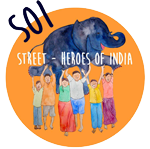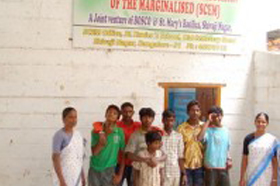We focus our services in training local caregivers (counselors and staff) to ensure the right guidance for the children’ psychosocial rehabilitation. We also support and provide supervision of particular psychosocial intervention initiatives as well as we promote activities and events aiming to raise public awareness about the need of this psychosocial intervention to achieve real rehabilitation of childhood and youth.
Psychosocial support is the right of every child.
Keeping this in mind……..Hundreds of children across the country leave their homes or live in deplorable conditions due to varied reasons(see below) and some of these vulnerable children land in cities and subsequently end up living on the streets, subjected to exploitations like trafficking, kidnap, begging, sexual abuse, harassment and child labour.
Runaways, street children, children of sex workers, abused children and child laborers all live in the care centers where we operate in India.
There are different sets of factors that may prompt a child to leave home:
Cruelty and Abuse: Many parents today still use the traditionally upheld methods of disciplining children by hitting them with belts, canes, sticks and so on. In families where one / both the parents is / are alcoholic(s) this cruelty is more pronounced (such as the parent flinging the child against the wall, sexual abuse, etc…) and the children may sustain more severe injuries. The young, gentle mind of a child is not designed to cope with such severe trauma and pain and when the situation becomes unbearable, the only escape the child knows is physical escape from the home – the source of the pain and torture.
Neglect: In large and / or economically deprived families, parents get little opportunity to devote time to their children. With both parents at work, the children go unattended for hours. The neglected and deprived among the children feel not only insecure, but also unjustly treated. In a state of rejection and hurt, they may turn hostile and run away from home in search of other places where they can belong and feel loved.
Broken Homes: Children living with a single parent or a stepfather or stepmother, or children, who are orphans, are most prone to emotional trauma and often suffer from feelings of rejection and insecurity that may drive them out in search of a place where they may be better accepted and loved.
Socio-Structural Causes: People start migrating from relatively undeveloped regions of the country to the developing regions often leaving behind their families and homes. Their housing however, finds no place in the city’s development plans. These people (men, women and children alike) take to the streets as their refuge.
Economic Causes: It is not that children have to be on the streets because there is no space for them in the shanty that the parents might have managed to erect in the city. Often, the earnings of the parents are insufficient to secure even the family’s most basic needs. Consequently the children have to be sent to work on the streets to supplement the family’s income. Social stratification on the basis of caste, creed, gender, community, ethnicity, etc. also results in geographic, social, cultural and political compulsions.
Quality of Education: Many street children are school dropouts. The dropout rate in India is quite high (36%-52%). Sometimes teachers depend on traditional methods of corporal punishment to discipline the children which in turn develop a phobia against school and education in the minds of the young ones. As a consequence, the entire learning atmosphere is not pleasurable.
Many other children (especially girls) are forced to drop-out from school in order to work with their parents or to look after their younger siblings while their parents are at work. As a result they may escape to the cities in the hope that they may be able to
Peer Group Influence: A few children leave their homes for street life because of the influence of their peers. Some children find themselves on the streets as a result of their peers encouraging them to leave the conflict-ridden homes they live in. This may be done by the peers glorifying the idea of city life, or of independent life out of the home.








